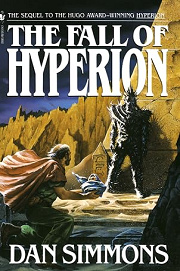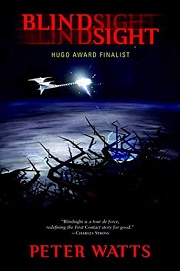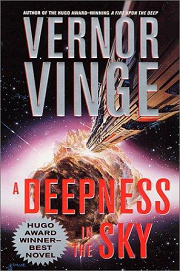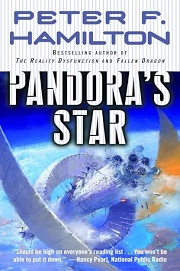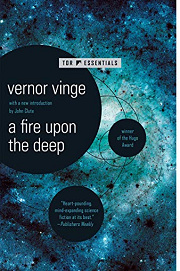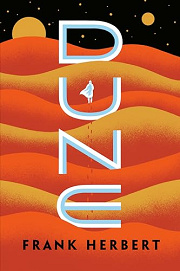Share your thoughts in a quick Shelf Talk!
The Fall of Hyperion by Dan Simmons
War brews across space and time as pilgrims’ intertwined destinies converge on choices that could reshape humanity’s future. Visionary and operatic, The Fall of Hyperion deepens the mystery and wonder with breathtaking scope and emotional power.
Have you read this book? Share what you liked (or didn’t), and we’ll use your answers to recommend your next favorite read!
Love The Fall of Hyperion but not sure what to read next?
These picks are popular with readers who enjoyed this book. Complete a quick Shelf Talk to get recommendations made just for you! Warning: possible spoilers for The Fall of Hyperion below.
In The Fall of Hyperion, did you enjoy ...
... the unsettling, idea-rich debates about consciousness, free will, and posthuman intelligence?
Blindsight by Peter Watts
You were hooked by the TechnoCore’s schemes to birth an Ultimate Intelligence and by Severn/Keats wrestling with what it means to be a person. In Blindsight, a posthuman crew confronts an alien intelligence that may not be "conscious" at all, pushing the same questions you felt when Meina Gladstone weighed human autonomy against the Core’s cold calculus, or when the Shrike’s time-twisted purpose challenged causality itself. If the cruciform’s perverse "resurrection" and Sol Weintraub’s moral quandaries made you ponder the price of being human, Watts will take you even further into that abyss—brutally, brilliantly, and with unforgettable set pieces aboard the ship Theseus.
... ruthless realpolitik and intelligence wars shaping a civilization’s fate across light-years?
A Deepness in the Sky by Vernor Vinge
If Meina Gladstone’s high-stakes gambits, the TechnoCore’s disinformation about the Ousters, and the ultimate decision to destroy the farcaster network thrilled you, you’ll savor the knife-edge politics here. A Deepness in the Sky pits free-trading Qeng Ho against the predatory Emergents, whose "Focus" turns minds into enslaved savants—an eerie echo of the Core’s instrumental view of humanity. Like watching Gladstone navigate crises while Severn relays perilous insights, you’ll track long-game espionage, moral compromises, and technological tyranny as two human factions vie over first contact with a nascent alien civilization.
... a sprawling mosaic of intercut viewpoints converging on a galaxy-shaking revelation?
Pandora's Star by Peter F. Hamilton
You enjoyed how Severn’s visions threaded together the pilgrims’ fates with Gladstone’s war council, letting many voices build toward the farcaster cataclysm. Pandora’s Star delivers a similarly compulsive tapestry: detectives like Paula Myo, tycoons, physicists, soldiers, and explorers all chase pieces of a mystery that erupts when humanity frees something terrible among the stars. If the way Father Duré, Brawne Lamia, Kassad, and the Consul’s stories interlocked kept you turning pages, Hamilton’s interwoven plots and slow-burn revelations will scratch that same itch—on an even larger canvas.
... cosmic-scale stakes with godlike AIs and time-bending menace that threaten all of civilization?
A Fire Upon the Deep by Vernor Vinge
The Shrike’s paradoxical presence and the TechnoCore’s ascendant god-mind gave The Fall of Hyperion its vertiginous scale—right up to Gladstone’s civilization-redefining sacrifice. A Fire Upon the Deep matches that awe: an ancient AI "Power" awakens, civilizations topple, and a desperate rescue may be the only hope. The Zones of Thought, the Tines’ world, and a race against an all-devouring intelligence will resonate if you loved the blend of vast ideas and intimate peril that ran from Severn’s dream-linked vantage to the Hegemony’s final hour.
... religion entangled with empire, prophecy, and sacrifice guiding impossible leadership choices?
Dune by Frank Herbert
If Father Duré’s cruciform ordeal, Sol and Rachel’s faith-testing tragedy, and the Church of the Shrike’s apocalyptic fervor gripped you—as did Gladstone’s willingness to shatter the farcaster web for a greater good—Dune will feel like coming home. On Arrakis, Paul Atreides wields prophecy, politics, and belief to reshape an empire, only to face the terrible costs of messianic destiny. The Bene Gesserit’s long game, Fremen zeal, and the spice’s spiritual and strategic power mirror the way faith, myth, and realpolitik collide around the Shrike and the TechnoCore.
Unlock your personalized book recommendations! Just take a quick Shelf Talk for The Fall of Hyperion by Dan Simmons. It’s only a few questions and takes less than a minute.
